- Home
- /
- Private: People Development
- /
- Learning Academy
- /
- Self Leadership
This topic is designed to give you options for improving your professionalism and leadership through increased self-Leadership. It includes:
- Why Self-Reflection is Essential
- What is Self-Reflection
- Know Thyself to Grow Thyself (Selection of stand alone Tools for increased Self-Awareness)
- How to Identify & Categorise your Professional Blind Spots
- Turning Feedback into Change (Development Action Planning)
- Next Steps
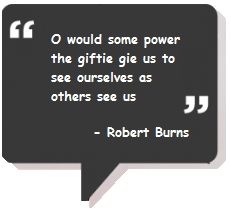 As a manager, we all hope that our decisions and messages are received by others the way we intend, but many things can prevent that from happening. Our conscious and unconscious actions can have an impact on the clarity of our messages, damage our effectiveness, and reduce our influence. This can cause our own attitudes and behaviours to be mirrored by our teams in ways we might not immediately notice.
As a manager, we all hope that our decisions and messages are received by others the way we intend, but many things can prevent that from happening. Our conscious and unconscious actions can have an impact on the clarity of our messages, damage our effectiveness, and reduce our influence. This can cause our own attitudes and behaviours to be mirrored by our teams in ways we might not immediately notice.
The truth is we all have professional blind spots which cause smart, well-intended managers to be perceived in unhelpful ways. Having the fortitude and resilience to hunt down and examine those blind spots and embrace what is found, can earn managers credibility, demonstrate integrity and cultivate relationships based on trust and respect.
WHY SELF-REFLECTION IS ESSENTIAL
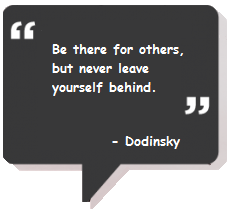 Imagine if an organisation had no mechanism for self-analysis or evaluation. No performance reviews, no customer-comment system, and no communication or reporting routes.
Imagine if an organisation had no mechanism for self-analysis or evaluation. No performance reviews, no customer-comment system, and no communication or reporting routes.
Without opportunities for insight and course correction, it couldn’t hope to function well for very long. Yet, in our action-oriented culture, the habit of self-examination and personal feedback is not a particularly common one, but what if it was…..?
There are no limits to personal and professional growth; it’s an on-going process. Self-reflection presents you with an opportunity to look at yourself from an objective vantage point, raising the unconscious to conscious to appreciate the things you do well and resolve to change the things you can improve.
A high level of self-awareness allows managers to deal with situations without distorting them by personal feelings and prejudices; be open to new ideas; embrace healthy challenge and welcome constructive criticism – moving from functioning effectively, to performing their best.
This also provides teams with credible role models, strong leadership, clear expectations and shared sense of purpose.
WHAT IS SELF-REFLECTION?
If you have ever tried to understand yourself better by stepping back from an experience and considering why you were feeling a certain way or why you did something, then you were using self-reflection.
Self-reflection in its simplest form is asking yourself thought-provoking questions so that you can develop a deeper level of understanding about yourself. Self-reflection is useful when we are unsure about something, when we feel like we could have done something differently, or when we want to remind ourselves what we are doing well or what we have accomplished.
Self-esteem and satisfaction are gained from two key areas (personal appreciation and external recognition) and so the main benefits of self-reflection fall into the same categories:
Personal Appreciation
Personal self-reflection can be very thought-provoking and difficult for some people. Often looking intently at who we are in a work context can seem needless and unrelated.
But understanding the fundamental link between your beliefs, attitudes and behaviours can result in very profound positive changes in how you see yourself.
It can be the gateway to gaining a productive sense of control, and recognition by others can also make you feel more comfortable in your workplace, which can encourage you to take on more difficult tasks in order to learn from them. This in turns increases a passion for your work.
Changing How We See Ourselves
Self-reflection is the primary process by which we can step outside the restriction of our own minds.
Being self-aware increases confidence because you know what your accomplishments are, what your skills are, and how your skills and knowledge have and continue to improve. You feel a stronger sense of control because you create “coping strategies” or ways to handle difficult situations. You feel more passion for your work because you change from being a passive worker to being a self- motivated worker that sets goals.
Professional Appreciation
Adopting professional self-reflection as a work practice can be challenging. It requires a deeper level of thinking about things we take for granted. It means that we have to take responsibility for our role in professional relationships and team development.
For some this can be a big change in perspective. Getting used to self-reflective may take some time, but the more you use this approach, the easier it will eventually become.
Changing how our managers, peers and teams see us through the use of self-reflective journals may be just the tool for our employers to finally understand where we fit into.
Changing How Others See Us
In the workplace we all value skills and qualities and use these to succeed, but these are things we do. Research shows that it is more important to us that we feel valuable. Self-reflection clarifies our unique professional value because it helps us:
- Explain what we do, what we have accomplished, and how we contribute to continuous improvements
- Make fewer mistakes or show that we are putting in the work to improve
- Learn skills in problem-solving, analysing, and critical thinking so that we add value to all areas of our work practice
KNOW THYSELF TO GROW THYSELF – TOOLS FOR SELF-AWARENESS
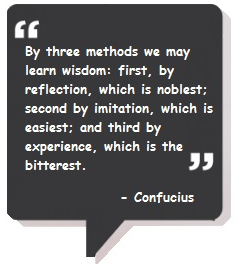 Sometimes the only way for us to make a major leap forward is to take a fresh look at where we are right now. This section includes a choice of two stand alone self-assessment activities, both allows you to hold up mirrors to get to know yourself better.
Sometimes the only way for us to make a major leap forward is to take a fresh look at where we are right now. This section includes a choice of two stand alone self-assessment activities, both allows you to hold up mirrors to get to know yourself better.
Download the activities, follow the individual instructions, and use the ‘dig deeper’ suggestions for maximum insight.
- My People Skills Self Assessment This assessment looks at key people skills and can be used to identify soft management skills gaps.
- My Johari Self Reflection Activity This activity examines our self perception and invites us to compare that to the perceptions of others. This is useful for communication and decision-making.
- My Management Behaviours This audit is linked to ACC’s Core Behaviours (and beyond) and would support and inform PR&D objective setting.
- My Self Leadership Development Action Plan This tool is designed to capture the learning from all of the assessment activities above, then drill down to a focused , achievable action plan that will demonstrate progress.
Users Note:
Why not encourage your teams to be self-reflecting, by using these free fun online assessment to get them talking at your next team meeting?
HOW TO IDENTIFY AND CATEGORISE YOUR PROFESSIONAL BLIND SPOTS
When we analyse what an outstanding leader is, very few can be described as well-rounded. All of us have blind spots or weaker areas and self-reflection can only give you part of the picture. This activity uses the feedback you have gathered from your peers, customers, managers and teams to begin the process of listing your own professional blind spots. If you have undertaken a 360° assessment you can use the information in this exercise.
My Johari Self Reflection Activity Download this activity and follow the individual instructions. Once you have completed the ‘Johari window of self-reflection’, focus on the ‘blind spots quadrant’
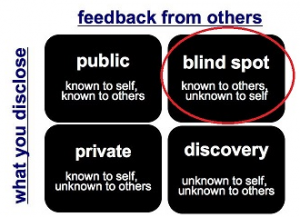
Begin assessing the nature and impact of each blind spot has on your specific job role. Categorising each blind spot as a fatal flaw or just a weaker area will help you to let go of your weaknesses and focus on your strengths
Focusing on strengths rather than weaknesses does not mean that you ignore all your weaknesses. Where a glaring weakness impacts so negatively people around you are affected, or it falls below Aberdeen City Council’s core management behaviours, it should automatically be classed as a fatal flaw and definitely needs to be addressed.
You should always be informed by direct feedback from peers, managers, teams, and others (e.g. a 360° assessment) on skills or competencies that actually matter to your specific role. For example, influencing may not be a fatal flaw to a highly creative person in a key technical role. The significant key is how the weakness impacts on your role.
Developing a practical coping mechanism to minimise the negative effects of a weakness or knowing where others can support you could leave you with much more energy, confidence and motivation to develop the blind spots that can be changed and would result in the most professional improvement and personal stretch.
TURNING FEEDBACK INTO CHANGE
Once you have a better understanding of yourself, your skills, your areas of strength and the nature and impact of your weaknesses, you need to plan for change. Getting control of your time, priorities, and setting clear goals will give you focus and purpose.
These tools are designed to help you frame your development:
My Self Leadership Development Action Plan
The purpose of these planning tools is to help you pinpoint which management and leadership skills you already have and use well, and the ones you would benefit from developing or using more. Remember development is an on-going process, there’s always room for improvement.
NEXT STEPS
Getting Comfortable in the Discomfort Zone
If you develop the habit of continually stretching outside your comfort zone a bit at a time it will never go back to its original size. You might try analysing a problem in a new way, developing a new skill, meeting new people who operate at the performance level you’re aspiring to, watching or listening to uncomfortably honest feedback, or making that tough phone call without putting it off. Daily or even just weekly small stretches accumulate into powerful new habits and make self-reflection part of your work practice.
The Power of Curiosity – Momentum check:
Don’t get complacent. It’s taken time to plot your Development Action Plan. Keep these questions in mind and set an email reminder for you to think about them regularly:
 How much progress have I been making towards my goals?
How much progress have I been making towards my goals?
Are there any obstacles or stuck areas I need to address?
Is my energy level high, or is it getting drained and blocked?
What’s one positive step I can take right away?
You don’t need to consider these questions on a daily basis, of course. But occasionally reviewing one or more of them is a great way to keep your personal and your professional developing growing.
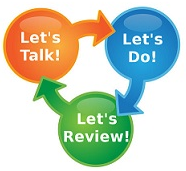
Let’s Collaborate…..
Improvement and change is part of our organisational life, but we know that every individual’s needs are slightly (and sometimes very) different. It costs nothing to talk and the People Development team love to listen – especially when people talk to use about creative and innovative development ideas.
These are your resource pages so why not talk to us about how they could help you and your colleagues to be better informed, passionate about their current development and ready to positively embrace change. You can talk to us on 523897 or email your feedback to organisationaldevelopment@aberdeencity.gov.uk
LINK TO RELATED TOPICS
- Goal setting
- Authenticity
- Trust
- Values
OTHER LINKS
The Resources Hub Home Page
The Essential Tools Home Page
Click here to return to the main Resources Hub page
Add a ‘Like’ and/or a ‘Rating’ below to indicate how useful you found this page